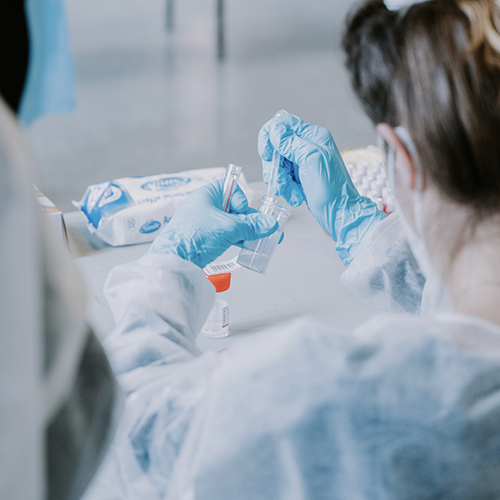
ACRC serves as a coordinating centre for clinical trials. We have the expertise and capability to conduct clinical trials at our fully-equipped site. Our experience, commitment, and creative resources in diverse therapeutic areas enable us to provide a full range of clinical development services for phase III clinical trials.
Medical Research; Ethics Committee (MREC) approval number for the study: NMRR-19-72-46351
Medical Research; Ethics Committee (MREC) approval date for the study: 07 May 2019
(MREC) approval date for the poster advertisement: 15 Jul 2019
The aim of this study is to assess the efficacy and safety of pembrolizumab as adjuvant treatment in adult patients with hepatocellular carcinoma (Liver Cancer) and complete radiological response after surgical resection or local ablation.
Eligible patients who are enrolled in the trial will receive treatment at minimum or at no cost at the medical centre participating in the trial. Taking part in the study will provide new information that will add to the current knowledge about liver cancer treatment, which may help other patients in the future.
Joint Penang Ethics Committee (JPEC) approval number for the study: 18-0045
Joint Penang Ethics Committee (JPEC) approval date for the study: 02 Nov 2018
The aim of this study is to assess clinical outcomes and patient-reported outcomes (PROs) in women with locally advanced/ unresectable or metastatic (Advanced Breast Cancer/ Metastatic Breast Cancer) HR+/HER2– breast cancer receiving palbociclib in combination with an aromatase inhibitor or fulvestrant.
Eligible patients who enrolled to the trial will be provided access to and trained on the use of a mobile application to complete baseline, daily, weekly, and cycle-based assessments for a period of 6 months, with an optional additional 6 month for participating patients.
ACRC welcomes researchers who are interested in conducting research in PAH. All research applications to PAH are processed according to the Policy and Procedures of Research Application. We process all types of research projects ranging from research applications by staff of PAH, research applications by Sponsors/Companies, and research applications by academic students. Complete research application will go to the research committee and/or Medical Dental Executives committee for review and approval. PAH requires all researchers to be GCP certified.
Clinical research is an integral part of the drug development process. It involves systematic measures used to assess the safety & efficacy of new medicines in human subjects. Often the clinical study or clinical trial compares the new treatment (commonly referred to as “investigational drug”) under evaluation with a placebo (an inactive substance designed to resemble the drug being tested) or the current standard treatment; Clinical Trials is any systemic evaluation of new medicines in human subjects whether in patients or healthy volunteers to discover or verify the potential benefits and/ or identify any adverse reactions or side effects to the new drug.
Every clinical study has a research team led by a Principal Investigator and/ or Co-Investigators who are often a medical doctor, Study Coordinator, Research Nurse, and other health care professionals.
Clinical trials are executed in four distinct phases (steps) designed to answer specific research questions. Each phase of the clinical trial has a specific goal and the information gathered is used to build knowledge on the new drug and support the subsequent phases of the drug development process.
| Phase I Study | The first of four phases of clinical trials. Phase I studies are designed to establish the effects of a new drug in humans. These studies are usually conducted on small groups of healthy volunteers (20-80) to specifically determine a drug’s toxicity, absorption, distribution and metabolism. |
|---|---|
| Phase II Study | After the successful completion of phase I trials, a drug is then tested for safety and efficacy in a slightly larger population of individuals (100-300) who are afflicted with the disease or condition for which the drug was developed. |
| Phase III Study | The third and last round of testing of a new drug is conducted on large populations of afflicted patients (1,000-3,000). Phase III studies usually test the new drug in comparison with a placebo or the standard therapy currently being used for the disease in question. The compiled results from the Phase I to Phase III studies are used to support the application to market the new drug submitted to the regulatory agencies (for example the U.S. FDA). The results of the Phase III trials usually provide the information that is included in the package insert and labelling once the new drug is marketed. |
| Phase IV Study | After a drug has been approved by the FDA, phase IV studies are conducted to compare the drug to a competitor, explore additional patient populations, or to further study any adverse reactions or side effects. All phases of clinical trials are executed according to a pre-established protocol or study plan. All protocols are conducted according to Good Clinical Practices (GCPs) and have approved from Institutional Review Board/ Independent Ethics Committee (IRB/ IEC). |
People who have exhausted standard (approved) treatment options – which either did not work for them, or they were unable to tolerate certain side effects can consider participating in a clinical trial as it may provide another option when standard therapy has failed. People can also participate in trials simply because they want to contribute to the advancement of medical knowledge through the findings of the study.
The benefits of participating in well-designed and well-executed clinical trials are having the chance to be actively involved in their health care, gain access to potentially new research treatments, have access to expert medical care for the condition being studied, and help others by contributing to medical research. Participation in a clinical trial is always voluntary.
Clinical trials and their ensuing positive outcomes can impact the health of people around the world by bringing these advancements to the marketplace and making them readily available to those in need. There are many advantages to conducting clinical trials, including:
Prior to entering a clinical trial, subjects must sign an informed consent.
Informed Consent: The process of verifying and documenting that a study participant willingly accepts to participate in a clinical trial. The informed consent is signed only after the subject has received complete, objective information about the clinical trial, including its objectives, potential benefits, risks and inconveniences, alternative therapies that may be available (if applicable), and the subject’s rights and responsibilities in accordance with the current revision of the Declaration of Helsinki. The subject’s rights to confidentiality while participating in a clinical trial is also covered in the informed consent. The informed consent also has the provision to inform the subject of any new information which is made available during the course of the clinical trial which may affect his/her continued participation in the study. The informed consent also specifies that participation in the clinical study is voluntary and that the subject can choose not to participate or can leave the clinical study at any time even after he/she has consented to participate. The informed consent is not a contract and the participant is not bound in any way. In sum, the rights of the person are safeguarded and protected at all times.
GCP is an international ethical and scientific quality standard for the design, conduct, performance, monitoring, auditing, recording, analyses, and reporting of clinical trials that provides assurance that the data and reported results are credible and accurate, and that the rights, integrity, and confidentiality of trial subjects are protected.
If your research involves research in human beings, this is a certification you must have. Researchers planning or currently engaged in clinical trials, clinical research associates, research managers or trials monitors working with pharmaceutical companies or contract research organizations will draw direct and immediate benefits. It will also bring you up to speed in conducting publishable world-class trials. Attending a GCP workshop is also a great opportunity to network with researchers and sponsors as well as research service providers. There is often rich cross pollination of ideas.
You can get certified through yearly workshops organised by the government or private healthcare sector which is usually a two and a half-day event. You can also get certified through a free online course.
Useful links: Clinical Research Centre , Clinical Trial
Clinical Research Centre
Monday - Thursday: 8:00am - 5:30pm
Friday: 8:00am - 5:00pm
Saturday, Sunday & Public Holiday: Closed
Malaysia Website Design, Lightflex.





